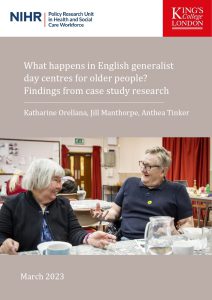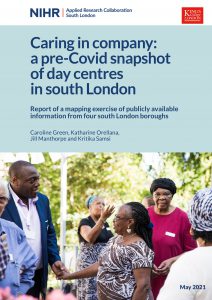Katharine Orellana & Kritika Samsi (NIHR Policy Research Unit in Health and Social Care Workforce, King’s College London; NIHR Applied Research Collaboration South London). (592 words)
Our unique new Day Centre Resources Hub was co-produced with day centres for older people and their broader professional stakeholders. We created the Hub to support day centre sustainability by improving knowledge about them, supporting their operation, and encouraging joint working.
The Hub provides useful information, practical tips, guides, case study examples and templates that can be downloaded and used to help inform your work. Topics covered include research, outcomes and impact, marketing, recruitment and local examples.
Day centres are often valued places for people with social care and support needs who want to remain living in their communities (Bennet et al 2023, Lunt el al 2021, Orellana et al 2020, Orellana et al 2024). Their providers would like these services to be more central to health and social care systems. Continue reading




